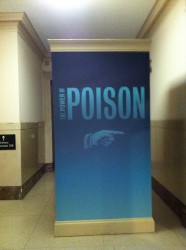 Recently I visited the Poison exhibit at the American Museum of Natural History in New York. It included a toxicological explication of the witches’ poem in MacBeth, which, by happy coincidence, my son is reading in English class right now (he’s loving every word of the play, should his teacher be reading this).
Recently I visited the Poison exhibit at the American Museum of Natural History in New York. It included a toxicological explication of the witches’ poem in MacBeth, which, by happy coincidence, my son is reading in English class right now (he’s loving every word of the play, should his teacher be reading this).
 Here’s an excerpt from the poem (Act IV, Scene I):
Here’s an excerpt from the poem (Act IV, Scene I):
Eye of newt, and toe of frog,
Wool of bat, and tongue of dog,
Adder’s fork, and blind-worm’s sting,
Lizard’s leg, and howlet’s wing,–
And a bit later…
Scale of dragon, tooth of wolf,
Witch’s mummy, maw and gulf
Of the ravin’d salt-sea shark,
Root of hemlock digg’d i’ the dark,
Followed two lines later by:
Gall of goat, and slips of yew
The exhibit explains that “tongue of dog” is from a plant known to Shakespeare as houndstongue, with leaves that are similar in shape and texture to a dog’s tongue. It was used medicinally in Shakespeare’s day, but was also a known toxin.
The exhibit description goes on to explain that “tooth of wolf” refers not to the animal but to the plant known as wolfbane, also called monkshood. It’s so toxic that just a few grams can kill a person, and it was suspected in the death of Roman emperor Claudius (10 BC – AD 54). I was surprised to read this about Claudius, as I always though he’d been offed by a platter of poisonous mushrooms served up by his charming wife, Agrippina (mother of Nero).
As for “root of hemlock” and “slips of yew”–most people know that hemlock is an ancient poison, which Socrates was ordered to drink as a mode of execution. And I vividly remember reading an Agatha Christie mystery, Pocket Full of Rye, where a guy was poisoned by yew berries that were stirred into his tea, and they’ve scared me ever since. Although from what I’ve since learned, the berries aren’t the poisonous part of the plant. Whatever. According to the AMNH exhibit, yew needles and arils are so toxic that chomping on just a few will kill a cow. The shrubs were often grown in churchyards because of their connection to death.
Yep, Shakespeare knew his poisons.